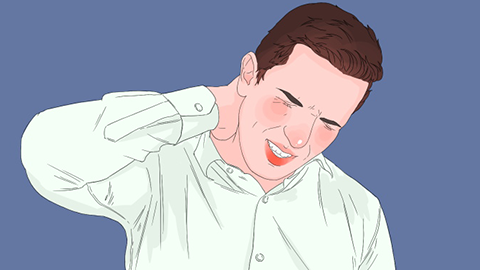Why does anxiety cause back and shoulder pain?
Anxiety patients may experience soreness and pain in the back and shoulders due to various causes, including muscle tension and spasms, abnormal postural compensation, cervical spondylosis, fibromyalgia syndrome, or ankylosing spondylitis. If discomfort occurs, it is recommended to seek timely medical evaluation and treatment at a正规 hospital. Detailed explanations are as follows:

1. Muscle Tension and Spasms
During anxiety, the sympathetic nervous system becomes overactive, causing sustained contraction of back and shoulder muscles in response to "stress." Prolonged muscle tightness can lead to spasms and soreness. Performing 10 minutes of neck and shoulder stretching exercises daily, applying warm compresses to painful areas, and practicing deep breathing during anxiety episodes can help relax the muscles.
2. Abnormal Postural Compensation
Anxious individuals often unconsciously adopt poor postures such as hunching the chest, slouching, raising the shoulders, or lowering the head. This leads to imbalanced muscle strain in the shoulders and back, resulting in accumulation of metabolic waste products and subsequent pain. Correct sitting and standing posture by keeping the spine straight. Take breaks every hour during work to move the neck and shoulders, and use chairs and pillows of appropriate height.
3. Cervical Spondylosis
Poor posture caused by anxiety can worsen cervical spine strain. Herniated discs may compress nerve roots, causing radiating pain to the back and shoulders. Medications such as celecoxib capsules, eperisone hydrochloride tablets, and Jingfukang granules may be taken under medical guidance. Cervical traction therapy is also beneficial. Avoid prolonged periods of looking down at mobile phones.
4. Fibromyalgia Syndrome
Anxiety can activate central nervous system sensitization, triggering fibromyalgia syndrome, which is characterized by widespread musculoskeletal pain, with the shoulders and back being common tender sites. Under medical supervision, medications such as pregabalin capsules, duloxetine enteric-coated tablets, and amitriptyline tablets may be prescribed. Engaging in regular, gentle aerobic exercise like yoga is also helpful.
5. Ankylosing Spondylitis
Anxiety may trigger or exacerbate ankylosing spondylitis. Inflammation affects the sacroiliac joints and spinal joints, leading to stiffness and soreness in the back and shoulders, particularly noticeable upon waking. Treatment under medical guidance may include etanercept injection, sulfasalazine enteric-coated tablets, and diclofenac sodium sustained-release tablets. Severe cases may require spinal corrective surgery.
In daily life, individuals should learn to regulate emotions through meditation or listening to music to alleviate anxiety; maintain proper posture to prevent excessive muscle strain; keep the shoulders and back warm to avoid cold exposure; perform regular neck and shoulder care, and engage in moderate physical activity consistently. Regular health check-ups are essential for early detection and treatment of related conditions.








